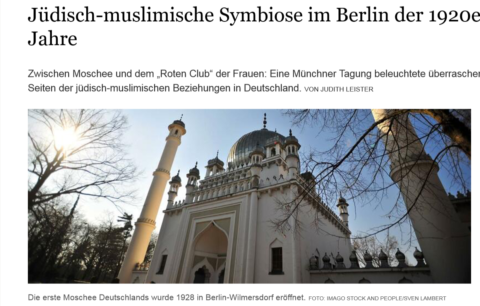Gerdien Jonker at the conference “Jews and Muslims in Germany”
In an article from 20 January 2020, the Tagespiegel wrote about the conference held by the the Bavarian Academy for Sciences and Humanities on 16 January 2020, where religious historian Gerdien Jonker contributed a talk about “Jews and Muslims in Weimar-Republic Berlin – a neighbourhood story”.
In the centre of the talk stood the oldest German Mosque Community in Berlin-Wilmerdorf where life reformers, revolutionaries, artists, theosophs and homosexuals had met under the roof of Islamic Modernism. Among them where Muslims from Egypt, Persia, India and the Caucasus, but also reformed Russian and German Jews. These minorities of the Weimar society had been embedded in a tight net of Jewish and “oriental” institutions, restaurants, cinemas, music clubs and other meeting points in a close environment. Within these circles, there had been engagement against colonialism and in the “Red Club”, Muslim and Jewish women had met to rearrange gender relations.
After 1933, however, the Mosque community had been taken over by the Nazis, who had then staged performances with the anti-Semitic Grand Mufti from Jerusalem Mohammed Amin al-Husseini. Nonetheless, it had secretely been possible to help some members of the congretation like Hugo Marcus and other Jews to escape to other countris, Gerdien Jonker explains.
The conference contribution, however, is only a small extract of the research Jonker has conducted over the past months and years. Based on the primary sources from private archives and photo collections, she was showing “deeper insights into the history of the Wilmersdorfer Moques-community”, all of which is available in full lenght in her new book “On the Margins – Jews and Muslims in Interwar Berlin“.
